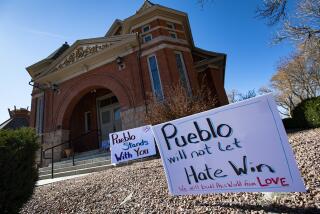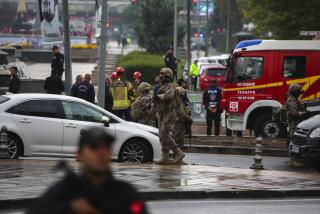Terror, Multiplied
- Share via
The terrorists who bombed the British Consulate and a British bank in Istanbul Thursday sent a lethal, highly targeted message. They simultaneously hit painful nerves in Britain, Washington’s closest ally in the war on terror; in Turkey, a moderate Muslim nation that has long shown that Islam and democracy are compatible; and in the United States, a nation whose president is in London on a pageantry-filled but uneasy state visit, attempting to shore up ties with Britain.
Turkey was still in shock from last Saturday’s bombings of two Istanbul synagogues that killed 25 people and injured 300. Turkish officials have arrested six people in connection with those explosions. In both attacks, two bombs exploded almost simultaneously. That degree of coordination is a hallmark of Al Qaeda, though no proof of responsibility has been brought forward.
Since the 9/11 attacks, many Al Qaeda operatives have been captured or killed -- but not Osama bin Laden and his top lieutenant. Pressure from the hunt has not stopped affiliated groups of Islamic radicals from launching terror attacks, and a Turkish newspaper said police sources had identified the synagogue attackers as members of a little-known Turkish group formed in Al Qaeda camps in Afghanistan.
A series of suicide bombings in Morocco, Indonesia and elsewhere has been blamed on Al Qaeda affiliates. The dispersal of terror groups outside Afghanistan after the U.S. invasion makes them harder to locate and stop; the invasion of Iraq has given their acolytes a new cause and a new country in which to train and fight.
President Bush and Prime Minister Tony Blair issued appropriate promises to find the terrorists and bring them to justice. Turkey’s immediate response to the synagogue blasts brought gratifying results. Determined investigators might also find those who dispatched the bombers Thursday. The explosions tore off the front of the HSBC bank and reduced consulate buildings to rubble. The British consul general was among the more than two dozen people killed.
Attacks on U.S. embassies and Jewish targets worldwide and in pro-U.S. countries can be solved and ultimately prevented only through close cooperation and intelligence-sharing among nations that contain cells of Al Qaeda and the group’s allies.
In the long term, Muslim nations will have to be persuaded that the invasions of Afghanistan and Iraq were not attacks on Islam and that the U.S. can be a good ally. Only a turnaround in perception can get people to turn in terrorists before they strike. Istanbul provided another reminder that the war on terror will be lengthy and will require help from many allies, facts that became clear to the U.S. on 9/11. That clear vision faded in the preemptive U.S. strike on Iraq. No matter how difficult the task, it must be restored.
More to Read
Sign up for Essential California
The most important California stories and recommendations in your inbox every morning.
You may occasionally receive promotional content from the Los Angeles Times.












